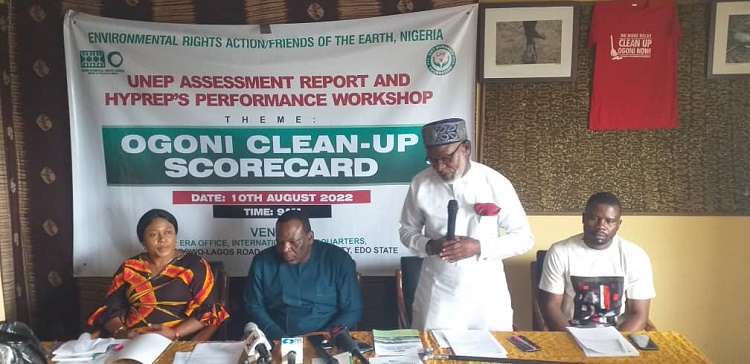Eleven years after it was created, the Hydrocarbon Pollution Remediation Project (HYPREP), the special purpose vehicle set up to implement the Ogoni cleanup process, has been scored low on performances by the Environmental Rights Action/Friends of the Earth Nigeria (ERA/FoEN).

At the UNEP Assessment Report and HYPREP’s Performances Scorecard Workshop held in Benin City, Edo State, on Wednesday, August 10, 2022, ERA/FoEN, in collaboration with the Lift Humanity Foundation (LHF), also called on the Federal Government to set up a $100 billion Fund for the cleanup and remediation of the polluted entire Niger Delta region.
At the forum themed “Ogoni Cleanup Scorecard”, the groups insisted that HYPREP has, despite the best efforts of concerned stakeholders, struggled to effectively deliver on any of the recommendations set out in the United Nations Environment Programme (UNEP) report.
“The agency lacks the manpower, strategies, expertise, and experience required to pull off a multifaceted cleanup, remediation, and restoration project of this magnitude. Their unpreparedness for the task was made even more glaring with the bungling of the first phase cleanup scoping and contract awards,” Dr Godwin Ojo, Executive Director, ERA/FoEN, submitted in a presentation titled: “HYPREP Scorecard: Hope Betrayed – An evaluation of the implementation of UNEP’s Environment Assessment of Ogoniland 11 years on.”
Ojo stressed that HYPREP is faced with myriads of challenges on the Ogoniland cleanup.
His words: “The agency was unable to manage expectations regarding the project and explain in clear terms what benefits communities would derive from the process. These challenges were exacerbated by the failure to make communities partners in the project planning process. Simple actions like creating a platform for communities and HYPREP to jointly develop workplans would have created a sense of ownership and eased the disenchantment that now pervades Ogoni regarding HYPREP.”
Apart from setting up a team to interface with government and advocate for HYPREP’s transparency and accountability, he called on the Ogoni community to persist in the engagement with HYPREP to reclaim ownership of the cleanup process and not let the tempo to wane.
“Ensure that platforms for engagements such as the Central Representative Advisory Committee organises a quarterly accountability forum at which HYPREP briefs the community on the status of projects and activities and expenditure,” Ojo noted.
He called on the Federal Government to reduce, to the barest minimum, “the unrestrained control of the Minister of Environment over HYPREP and the cleanup process to allow more time and resources for the cleanup work”.
He further called on the Nigerian government to:
- Further review the HYPREP structure to ensure that the original goals of having an independent, transparent, accountable, and flexible structure that allows for efficiency in the delivery of HYPREP’s activities are achieved and importantly that HYPREP does not become a channel for political patronage.
- Enforce transparency and accountability in HYPREP by requiring the audit and regular publication of HYPREP’s accounts and activities to all stakeholders via its website and community accountability forums.
- Work with the Ogoni people, civic groups, UNEP and other international groups to set in motion an international donors forum to replenish the Ogoni Trust Fund to enable the continued implementation of remediation and restoration work in Ogoniland.
- Ensure that Shell is removed entirely from the day-to-day implementation of the cleanup and restoration work. Shell, he added, should continue to be a contributing stakeholder under the polluter pays principle but it should not be directly or indirectly in charge of the cleanup, remediation and restoration process.
He wants the Governing Council, the Board of Trustees and the Project Coordination Office to:
- Take up its responsibility of driving policy and approving workplans and budgets as a collective unit, adding that the current situation where the Minister of Environment appears to have taken on the role of the entire governing council does not allow for proper checks and balances and has also introduced government bureaucracy which delays the project.
- Ensure that the recommendations proposed by UNEP are strictly implemented and in the event that any deviation would be required ensure wide consultation with all stakeholders to explain the necessity of the deviation and obtain consent.
- Overhaul the contracting and procurement process to ensure that adequate scoping is done before contracts are awarded in order to avoid the situation where contractors discover major issues while delivering their work and they cannot respond to such issues because their contract does not cover these new issues.
- Overhaul and revamp the communications unit of HYPREP to ensure availability of information and more positive engagement between HYPREP and other stakeholders.
Besides staying out of the HYPREP cleanup, remediation, and restoration process, he called on Shell to pay for the harm it has caused “but should do no further harm to the environment, people and future of Ogoni”.
While asking UNEP and other international agencies to stay on course for the sake of the people of Ogoni and ensure that a world class remediation project is delivered, Ojo urged the UN body to conduct an independent audit of the projects and activities implemented so far by HYPREP that will be available to the public.
“We have read some of the analysis on HYPREP, but these are only for the consumption of the governing council of HYPREP,” he stated.
